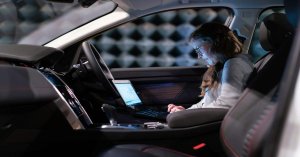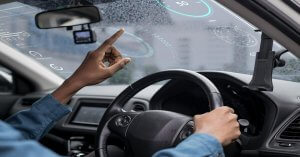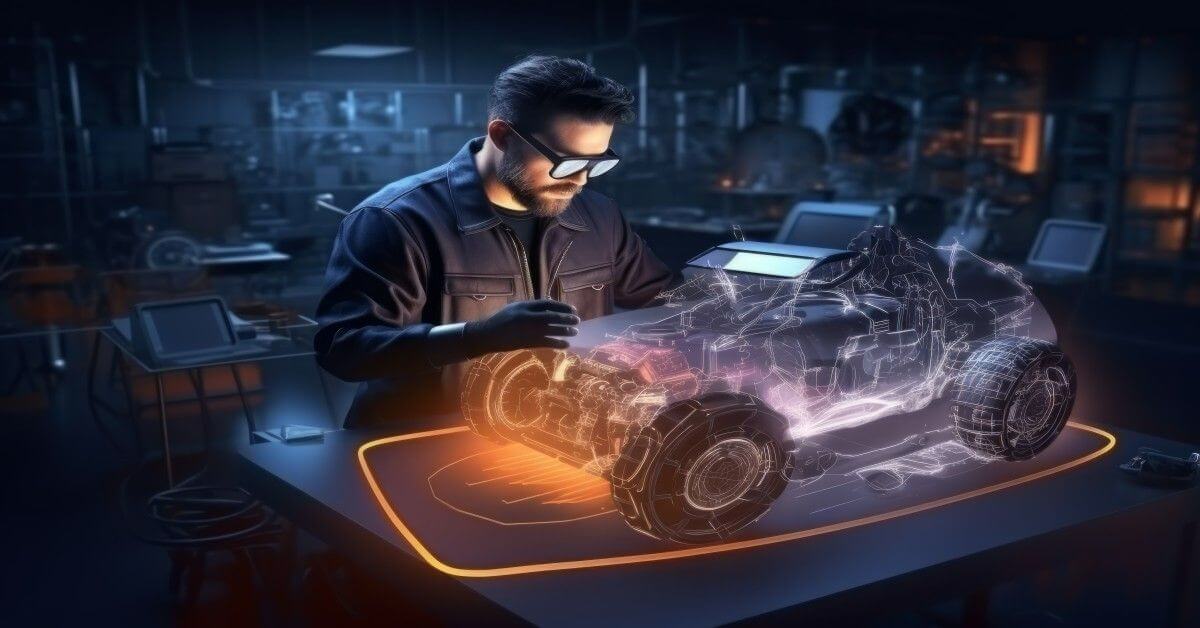Table of Contents
1. What is automotive technology?
Change is the only constant, and evolution is the enabler of change. It is not only that living beings evolve.
Technology, an intelligent by-product of evolved and still evolving human beings, is growing daily, and this evolution is very much visible in the automotive industry too.
Before we delve deeper into understanding from A to Z the role of technology and how it is revolutionising the automotive industry and its future, let’s first understand the meaning of automotive technology.
Automotive is the heartbeat of modern transportation. Automotive technology is a dynamic blend of engineering and innovation. Automotive technology combines design,
development, and advanced systems applied to vehicles and their devices to enhance performance, efficiency, and safety. Let’s learn more about what the future of automotive technology has to offer us.
2. Enabling Trends in Automotive Technology.

Electric Vehicles: One of the most significant trends in the automotive industry is electric vehicles. They are environment-friendly and produce zero greenhouse gases, thus contributing to the global effort to combat climate change.
Adoption of EVs reduces the usage of fossil fuels and, hence, enables sustainability. The advancement in new battery technologies, extended driving ranges
and growing charging infrastructure are making EVs economical, environment-friendly, and more appealing choices for consumers.
Driverless Vehicles: Self-driving cars are no longer a concept, but they have become a reality now. Companies like Tesla and Waymo are the pioneers in this segment.
Autonomous vehicles use technologies like AI, ML, sensors, cameras, etc. to drive a vehicle without human intervention. Such technology can hugely impact human mobility and reduce accidents and traffic jams to a great extent.
Connected Car Technology and IoT: Connected car technology enables an easy flow of communication between different cars, infrastructure,
and other smart devices, enhancing the driving experience. Vehicle-to-everything technology promises ease in traffic management, safety, and convenience and paves the way for smart cities and integrated transportation systems.
Sustainability and Green Technology: Apart from electrification, another way through which technology in the automotive industry is enabling sustainability is the choice of material used.
Today, there is a great deal of focus on the use of lightweight, recyclable materials, and there is a growing emphasis on eco-friendly manufacturing processes.
Hydrogen fuel cells and biofuels are also being explored as alternative sources of fuel for vehicles.
Advanced Driver Assistance Systems for Enhanced Safety: The ADAS technology aims to assist the driver in the safe operation of the vehicle.
The technology is designed to remove the human error component while operating a vehicle. It uses advanced technologies to assist the driver during driving and, hence, improve performance.
3. Challenges in the Automotive Industry

As the automotive industry moves towards a more sustainable, connected, and autonomous future, it also faces several significant challenges along the way.
Addressing such challenges requires innovation, collaboration, and forward-thinking. Here are the key challenges faced by the automotive industry:
Developing Infrastructure for Electric Vehicles: EVs are a new and yet evolved technology that faces many challenges, like battery efficiency in terms of efficiency, charging, and cost. Also, developing infrastructure for EV charging is a big task.
Autonomous Vehicle Safety and Regulations: Ensuring the safety and reliability of autonomous vehicles in a complex regulatory landscape is a challenging task.
This requires rigorous testing and validation processes for AI technologies, the establishment of clear and consistent regulations and standards at national and international levels,
and, more importantly, fostering collaboration between automakers, technology companies, and regulatory bodies.
Cybersecurity: The increasing connectivity of vehicles with other devices also puts them at risk of cyberattacks. Ensuring such safety is very important.
Consumer Acceptance and Trust: Gaining consumer acceptance of new technologies in the automotive industry can be tricky. Focus and efforts must be made to educate consumers, which is vital.
Environmental impact and sustainability: There is a need to break the chain of one technology, giving rise to a new environmental problem.
It is paramount to ensure that every new technology adopted is sustainable in its use and manufacturing processes too.
Talent and skill gaps: the need for a skilled workforce in new technologies and digital competence. Investing in education and training programmes to upskill professionals and consumers is a must.
4. Innovation in the Automotive Industry

With daily developments in technology, the automotive industry is on the brink of unprecedented, ground-breaking innovation that promises to revolutionise the way we think about transportation.
Solid-State Batteries: Solid-State Batteries are set to replace traditional lithium batteries used in EVs. They offer higher energy density, faster charging, and enhanced safety in this car.
Vehicle-to-Everything Communication: V2X communication technology enables vehicles to communicate seamlessly with each other and with infrastructure like traffic lights and road signs, enhancing safety and reducing accidents.
Autonomous driving: With the application of advanced AI and ML systems, developing driverless cars without any human intervention fosters innovation in mobility.
Augmented reality dashboard: The AR dashboard will overlay navigation and other safety warnings and essential information directly onto the windscreen to provide drivers with real-time relevant data to make quick decisions and enhance safety on the road.
Hydrogen-Fuel Cells: Hydrogen-Fuel Cells technology is soon to pose as an alternative to batteries. They omit zero greenhouse gases and generate electricity by combining hydrogen with oxygen, producing only water as a by-product.
Biometric vehicle access: biometric lock systems are soon to replace keys and fobs, enabling drivers to unlock with fingerprints, facial recognition, or voice commands. This not only enhances security but also provides a personalised experience.
Autonomous Electric Flying Cars: The dream of flying cars is soon to become a reality with the development of electric vertical take-off and landing (eVTOL).
These flying cars will help reduce the congestion on roads, shorten travel distance and time, and provide a completely new mode of transportation.
3D Printing in Manufacturing: 3D printing is set to revolutionise the way manufacturing happens in the automotive space. It will enable the manufacturing of durable, sustainable, lightweight, complex components in no time and reduce waste.
This technology will enable rapid prototyping and customisation.
Blockchain for Vehicle Data Security: The future will see blockchain technology being used to secure vehicle data, ensuring the integrity and privacy of information, thus enhancing trust and transparency.
Reconfigurable Interiors: Future vehicles will see cars that can completely transform their interiors based on occupants’ needs and moods.
Role of Big Data: Big Data will play a crucial role in driving innovation and optimising performance.
The use of big data will act as an enabler of technological advancements and integration, thus providing car owners with safety, efficiency, and a more personalised experience.
5. Impact of Nex-Gen Automotive Tech on Car Servicing
Predictive maintenance: Modern vehicles are equipped with advanced sensors and diagnostic systems that continuously monitor the health of different parts of the vehicle.
The predictive maintenance system uses data from these parts to predict when any part of the car might need maintenance or change.
This is a proactive approach that will help car owners keep their vehicles in good condition, cut costs, avoid sudden repair work, and increase the vehicle’s longevity.
Telematics: Telematics enables real-time data exchange between the vehicle and the service centre. This allows technicians to remotely diagnose any issue in the car and perform any repairs.
Enhance Customer Experience: Automotive tech applications by car service providers enhance the quality of services. When it comes to efficiency, the automotive tech vs.
mechanic choice becomes easier for car owners. Automotive tech has an edge over manual mechanical work. All this helps enhance the customer experience.
Remote software updates: Telematics also enables the technician to perform over-the-air software updates remotely.
Enhanced customer experience: Adoption and integration of new technologies provide customers with an enhanced customer experience.
6. Sustainable Practices in the Automotive Industry
1. Reduction of Carbon Footprints: As we move towards more sustainable technology, we reduce our carbon footprints, thus contributing to a cleaner and greener future.
2. Eco-friendly manufacturing: Nexgen automotive technologies enable auto manufacturers to adopt eco-friendly manufacturing processes.
3. Recycling and reuse: A greater emphasis on the use of recyclable material in the automotive industry will be seen, especially in the manufacturing process, thus aiming to minimise the environmental impact of automotive manufacturing.
Conclusion
Automotive technology is not only enhancing our driving experience but also fundamentally changing the entire ecosystem around the automotive industry.
The future of automotive technology holds immense promise and potential—the promise of a better and brighter future and the potential to reshape mobility.


